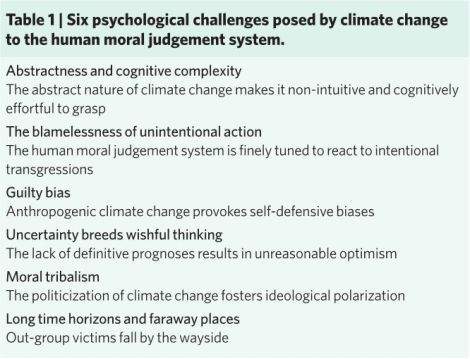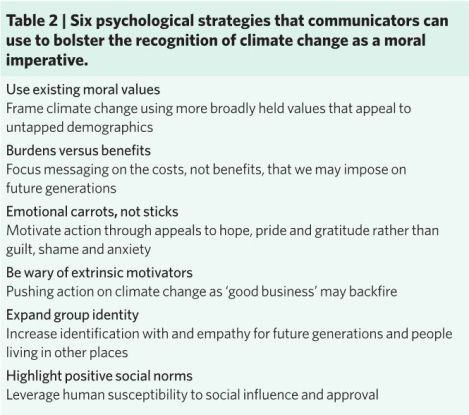
Photo by Kenny Louie.
Perhaps the single biggest barrier to action on climate change is the fact that it doesn’t hit us in the gut. We can identify it as a great moral wrong, through a chain of evidence and reasoning, but we do not instinctively feel it as one. It does not trigger our primal moral intuitions or generate spontaneous outrage, anger, and passion. It’s got no emotional heat. (Ironic!)
I (and countless others) have tried to explain, address, and overcome this aspect of climate change many times, in many different ways. But the single best thing I’ve read on it is a new paper in Nature Climate Change called “Climate change and moral judgment,” by Ezra Markowitz and Azim Shariff, of the University of Oregon Psychology and Environmental Studies departments respectively. In it, they “review six reasons why climate change poses significant challenges to our moral judgment system and describe six strategies that communicators might use to confront these challenges.”
This is one of the most valuable things I’ve read on climate in ages, so it’s a damn shame it’s behind a pay wall. (I mean, it’s great, but I can’t in good conscience tell you to pay $32 for it.) To compensate for this unfortunate state of affairs, I’m going to quote from it liberally.
Here’s the basic thesis:
[C]limate change poses significant challenges to our perceptual, cognitive and affective information-processing systems, making it and its threats difficult to engage with and appreciate. For example, the non-linear nature of the climate system leads even highly educated individuals to incorrectly predict the trajectory of future atmospheric greenhouse-gas concentrations, and the abstract, probabilistic and intangible nature of climate change dampens emotional reactions to information about the issue. Moreover, when individuals do respond emotionally, their reactions are often defensive and counterproductive.
They go on to identify six reasons why, “unlike financial fraud or terrorist attacks, climate change does not register, emotionally, as a wrong that demands to be righted.” Here’s a handy table:
These are pretty self-explanatory, but here’s a bit more on each one:
1. Abstractness and cognitive complexity: Climate change is tough to understand. It “requires cold, cognitively demanding and ultimately relatively less motivating, moral reasoning.” People underestimate this. Very little that arrives in our worldview through a purely intellectual route ends up stirring the viscera.
2. The blamelessness of unintentional action: Nobody is heating the atmosphere on purpose. It is seen as an unintended side effect of other activities. And people treat intentional harms much more severely than they do unintentional harms. So “understanding climate change as an unintentional phenomenon with no single villain may decrease motivation to right past wrongs.”
3. Guilty bias: We’re all somewhat to blame for climate change. To avoid feeling guilt, shame, and regret over that, “individuals often engage in biased cognitive processes to minimize perceptions of their own complicity,” especially when “individuals and communities feel incapable of meaningfully responding behaviourally.”
4. Uncertainty breeds wishful thinking: It’s not clear exactly how climate change will play out, and “uncertainty about future outcomes generally increases self-oriented behaviour and … promotes optimistic biases.” When scientists communicate the probabilistic nature of climate impacts (for instance, through analogies like “loading the climate dice”), “recent research shows that individuals often misinterpret the intended messages … and tend to do so over-optimistically.”
5. Moral tribalism: Messaging about climate has tended to focus on liberal values (harms and unfairness) and disregard conservative values (loyalty, respect for authority, and purity/sanctity). As a result, many conservatives “have been left not just uninvolved in action on climate change, but morally hostile to it.”
6. Long time horizons and far away places: Victims of climate change are viewed as far away in space or time. “The consequence of this spatial and temporal distance is that victims of climate change are likely to be seen, at best, as relatively less similar to oneself than are nearby contemporaries, and at worst, as out-group members.” Climate victims are seen as Other, and you know how we tend to treat the Other.
As a diagnosis of the difficulties climate change poses to our moral machinery, this all seems dead on to me. I’ve seen each one of these play out in miniature many times over the years.
The authors then move on to their recommendations. As always in these sorts of discussions, I find the prescriptions somewhat less convincing than the diagnosis, but these are better than most. Some of them challenge assumptions cherished by me and other climate hawks. Here’s the handy table:
Here’s a bit more on these, with some commentary:
1. Use existing moral values: This one is pretty familiar by now: “self-reinforcing, politically polarized discourse on climate change … might be overcome by highlighting consequences in which political conservatives are invested,” like corruption of the “sanctity of the natural world.”
Over the years, I’ve heard many people try to pitch climate change to conservatives as a threat to national security (i.e., to order and authority) or the sanctity of God’s green earth. It never seems to get much traction or change anything. I myself harbor a dark suspicion that climate change simply isn’t a problem that submits to formulation in terms of conservative values. I remain to be convinced otherwise.
2. Burdens versus benefits: This one was interesting and counterintuitive to me: “Recent findings suggest that individuals are significantly more concerned over the ethical implications of saddling future generations with burdens than they are about providing benefits.” It turns out people are less motivated by a possible reduction in good things provided others than they are by a potential increase in bad things imposed on others. So the authors recommend “focusing messaging on the burdens that unmitigated climate change will leave on future generations (for example, higher adaptation costs, greater human suffering from disease) rather than on potential benefits (for example, a viable, vibrant planet).”
I’m not sure I know exactly how to explain this, but it may just be that imposing something bad on people feels more intentional, more culpable, than leaving them with less of something good. Either way, it cuts against the cheery “future that makes sense” stuff I’ve been going on about, not to mention the general turn in the climate community toward promising great benefits from climate mitigation. Maybe Joe Romm’s “hell and high water” is what activates people after all.
3. Emotional carrots, not sticks: This seems somewhat in tension with No. 2. How exactly do you convince people that they are imposing burdens on others without making them feel guilty? But I’m definitely sold on the superior motivating power of positive emotions (the authors single out pride in particular). This gets at something I talk about a lot, which is how the climate movement might do a better job celebrating victories, scoffing at opponents, and putting on a little swagger. Fellow-feeling and pride will do more to keep people going than endless reinforcement of the hopelessness of the problem.
4. Be wary of extrinsic motivators: This one cuts directly against the most popular trend in climate messaging, which is emphasizing the economic growth and jobs that can come from climate mitigation. The authors acknowledge that sometimes engaging in climate mitigation for other reasons could “potentially lead to further pro-environmental attitude and behaviour change in an effort to avoid cognitive dissonance.” (This is known as the commitment effect — once we do something we’re inclined to act in ways consistent with that commitment in the future.)
However, they say, “recent research demonstrates that promoting extrinsic values can actively inhibit individuals from developing intrinsic, non-materialist motives” and “consistent reliance on extrinsic incentives for a behaviour can crowd out pre-existing intrinsic attachments to that behaviour.” The lesson seems to be that economic (and other extrinsic) motivators might help some in the short term, but they are not a sufficient foundation for a long-term effort.
I don’t know if I entirely buy this. What is the intrinsic motivation supposed to be? “Love of Mother Earth”? That’s not why I’m a climate hawk. I’m a humanist — I care about the welfare of people! I care about people, so I don’t want climate change to harm them. But for the very same reason, I’d like to see economic benefits and jobs come from climate mitigation. That motivation is not extrinsic to me. If only “love of planet” counts as intrinsic motivation for the climate fight, we’re in trouble.
5. Expand group identity: This one seems both obvious and difficult. It is certainly true that “framing the victims of climate change in ways that underscore shared goals and identities should similarly increase their moral standing, and with it, motivation to help them.” But how do you do that exactly? How do you increase fellow-feeling toward those who are spatially and temporally distant? I mean, I’d love it if Americans saw Bangladeshis as part of the human family. I’d love it if they saw the citizens of 2100, or 2300, as part of “us.” But they don’t seem to. Efforts in the past to grow fellow-feeling into a catholic, all-encompassing sentiment — Jesus’s efforts, for example — don’t seem to have succeeded very well. I’d like to hear a lot more about this one.
6. Highlight positive social norms: This is, to me, the Big Kahuna. As I was reading about all the psychological barriers to climate action, I kept thinking, “one thing can overcome all these: peer pressure!” If people see others that they view as peers or leaders doing something, they will tend to do it too, and retrofit reasons for it after the fact. This is the essence of humans as social creatures.
The recommendation is twofold, though: not just to “highlight pro-environmental, prosocial injunctive norms such as prohibitions against being wasteful,” but also to “be careful not to inadvertently highlight negative, but existent, descriptive norms, which can actually encourage individuals to follow suit in the wrong direction.”
In other words, you want to emphasize that climate hawkery is good, socially desirable, admirable, and that all the cool kids are doing it. You don’t want to give people the impression that “everyone’s doing it” if it is bad. Even if you state clearly that it’s bad, the fact that others are doing it is, in and of itself, a powerful incentive to do it too. It’s the herd instinct. This is good reason not to whine on and on about how everyone drives too much or everyone wastes electricity. The subtext is, “it’s the social norm.”
—
Aaaanyway, this is a lot of food for thought. But it’s the kind of stuff — not about science but about people — that far too many climate hawks ignore or disregard. Climate change is not only the economic and ecological crisis of our time, it’s also a moral crisis. What we are doing to our descendants is a moral crime. Finding ways to help people get that, feel it in their guts the way they would if someone threatened their own families, is a precondition for serious, sustained action.






